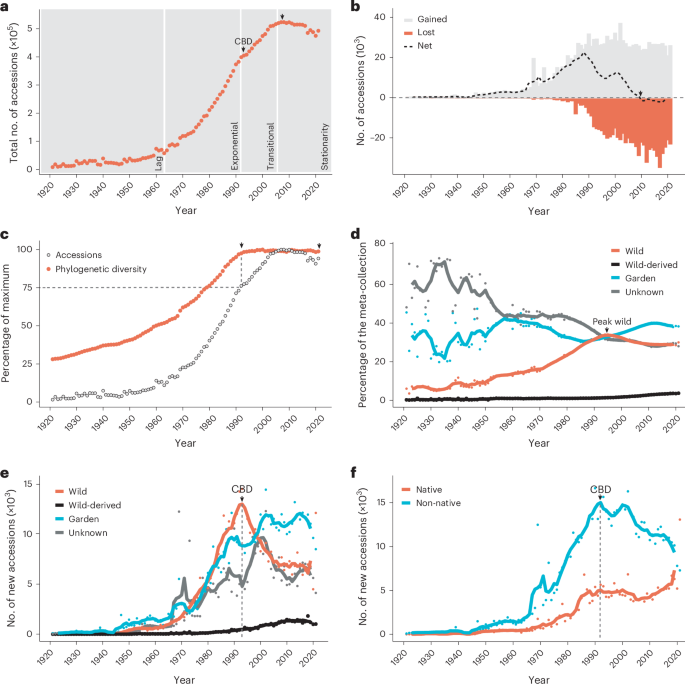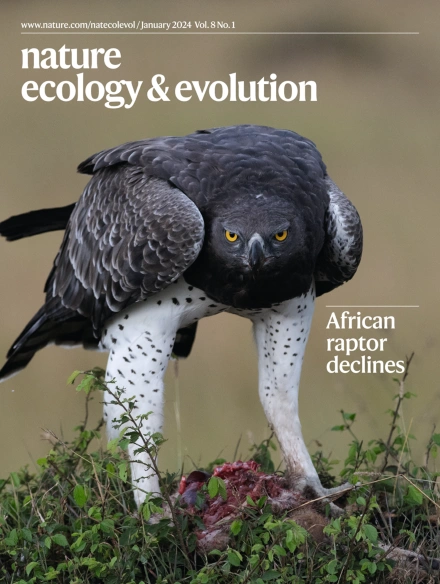Insights from a century of data reveal global trends in ex situ living plant collections
IF 13.9
1区 生物学
Q1 ECOLOGY
引用次数: 0
Abstract
Ex situ living plant collections play a crucial role in providing nature-based solutions to twenty-first century global challenges. However, the complex dynamics of these artificial ecosystems are poorly quantified and understood, affecting biodiversity storage, conservation and utilization. To evaluate the management of ex situ plant diversity, we analysed a century of data comprising 2.2 million records, from a meta-collection currently holding ~500,000 accessions and 41% of global ex situ species diversity. Our study provides critical insights into the historical evolution, current state and future trajectory of global living collections. We reveal sigmoidal growth of a meta-collection that has reached capacity in both total accessions and total diversity, and identify intrinsic constraints on biodiversity management, including a median survival probability of 15 years. We explore the impact of external constraints and quantify the influence of the Convention on Biological Diversity, which we link to reduced acquisition of wild-origin and internationally sourced material by 44% and 38%, respectively. We further define the impact of these constraints on ex situ conservation but highlight targeted initiatives that successfully mitigate these challenges. Ultimately, our study underscores the urgent need for strategic prioritization and the re-evaluation of ex situ biodiversity management to achieve both scientific and conservation goals. The authors collate a meta-collection of ex situ living plant diversity held in 50 botanical collections worldwide, spanning a century of data and currently containing ~500,000 accessions. Their analyses examine the capacities and constraints within living plant collections, reveal the impact of the Convention on Biological Diversity and its consequences for material exchange and conservation, and call for the re-evaluation of strategic priorities.


从一个世纪的数据中得出的见解揭示了迁地活植物收藏的全球趋势
迁地植物收集在为21世纪的全球挑战提供基于自然的解决方案方面发挥着至关重要的作用。然而,这些人工生态系统的复杂动态尚未被量化和理解,影响了生物多样性的储存、保护和利用。为了评估对迁地植物多样性的管理,我们分析了一个世纪以来的数据,包括220万条记录,这些数据来自一个元收集集,目前拥有约50万条记录,占全球迁地物种多样性的41%。我们的研究为全球生物收藏品的历史演变、现状和未来轨迹提供了重要的见解。我们揭示了一个元集合的s型增长,在总数量和总多样性方面都达到了容量,并确定了生物多样性管理的内在限制,包括15年的中位生存概率。我们探讨了外部限制的影响,并量化了《生物多样性公约》的影响,我们将其与野生来源和国际来源的材料的获取分别减少44%和38%联系起来。我们进一步定义了这些限制对迁地保护的影响,并强调了成功缓解这些挑战的有针对性的举措。最后,我们的研究强调了迫切需要对迁地生物多样性管理进行战略优先排序和重新评估,以实现科学和保护目标。
本文章由计算机程序翻译,如有差异,请以英文原文为准。
求助全文
约1分钟内获得全文
求助全文
来源期刊

Nature ecology & evolution
Agricultural and Biological Sciences-Ecology, Evolution, Behavior and Systematics
CiteScore
22.20
自引率
2.40%
发文量
282
期刊介绍:
Nature Ecology & Evolution is interested in the full spectrum of ecological and evolutionary biology, encompassing approaches at the molecular, organismal, population, community and ecosystem levels, as well as relevant parts of the social sciences. Nature Ecology & Evolution provides a place where all researchers and policymakers interested in all aspects of life's diversity can come together to learn about the most accomplished and significant advances in the field and to discuss topical issues. An online-only monthly journal, our broad scope ensures that the research published reaches the widest possible audience of scientists.
 求助内容:
求助内容: 应助结果提醒方式:
应助结果提醒方式:


